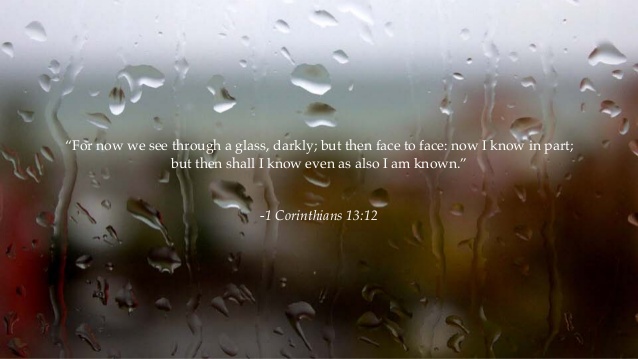[Greek] αἴνιγμα (ainigma), [Latin] enigma: riddle, obscure saying, enigma, obscure thing, what is rendered darkly, hint, manner difficult to understand, puzzle; 1Cor.13:12

Like a clouded window, bronze mirrors (in Corinth) were considered only to be just fair reflectors of reality.
Background Information:
Ancient Greece: This term refers to an enigma, riddle, or puzzle. Riddles in the ancient world were a popular past-time enjoyed by all social classes (grownups and children alike). Plato dismisses riddles as an inferior form of knowledge. Aristotle connects riddles with metaphors. Because of their mysterious or ambiguous nature, oracular and prophetic announcements were often linked with riddles. In Sophocles’ tragedy Oedipus at Colunus, the Sphinx asks Oedipus a riddle (enigma). Plutarch considered enigmata as challenges posed by god to mortals. At Greek symposia (drinking parties), one who solves a riddle often received a reward. The image of looking in a mirror arises from Hellenistic magical practices.
Old Testament: The riddle is likened to a mirror which gives an indistinct and clouded picture. The image of the glass and mirror are similar. To see in a glass also means to see prophetically, often in an unclear manner. Unlike with Moses, God often reveals Himself in clouded images. In a sense needed only one mirror (himself) to see God. The later generations of rabbis “saw” God with the help of nine mirrors (prophets). It is clear that seeing in a glass can infer participation in the divine revelation in a certain sense. Face to face I speak to Him, plainly and not in riddles (Num.12:8). The Queen of Sheba came to test him with subtle questions (1 Kgs.10:1). Daniel explaining riddles and solving problems (Dan. 5:12). Son of ma, propose a riddle, and speak this proverb to the house of Israel (Ezek.17:2). The vision was like that which I had seen when he came to destroy the city (Ezek.43:3).
New Testament: This term occurs only one time. As in the Old Testament, a riddle and mirror both point to prophetic revelation. Paul uses the example of a mirror to indicate that heavenly things are often puzzling, indistinct, and unclear. Mirrors can only provide a reflection of reality, not the reality itself. This can illustrate the dim and imperfect manner in which we understand heavenly and eternal things.
Scripture:
“At present we see indistinctly, as in a mirror, but then face to face. At present, I know partially’ then I shall know fully, as I am fully known.” 1 Cor. 13:12
Paul states that we can partially see and understand heavenly things. These images are puzzling and unclear. ‘Face to face’ refers to Moses’ encounter with God.
Conclusion:
Enigma, enigmatic
It is encouraging to discover that human nature is constant throughout the centuries. Ancient Greeks also enjoyed riddles and puzzles. I suppose it is not surprising that Greco-Roman symposia (drinking parties) would find any reason (occasion) to indulge themselves. Perhaps, it is also not surprising that some philosophers would have snobbish or elitist attitudes toward riddles.
It is not surprising that the Old Testament prophets’ messages could also be shrouded in mystery. It is interesting to note that the Old Testament culture also makes mention of mirrors pertaining to seeing in an unclear manner.
In the ancient world, mirrors were still considered poor reflectors of reality. Interestingly, Corinth had a worldwide reputation for making mirrors made out of bronze. Corinth was a prominent commercial and trading city. Bronze mirrors provided a fair reflection of reality. Most likely, Paul was referring to a bronze mirror in Corinth.
